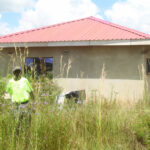Harare – Christopher Mutsvangwa’s recent unrestrained attack on Vice-President Constantino Chiwenga has ignited speculation about his own presidential ambitions and his desire to weaken a perceived rival. However, political analysts are casting doubt on his ability to secure the top job, citing his poor electoral record and questionable standing within Zanu-PF.
Chiwenga is widely considered a frontrunner to succeed Mnangagwa when his term expires in 2028. However, Mnangagwa’s loyalists have been pushing for an extension of his term to 2030, a resolution adopted at the party’s annual conference in Bulawayo last year. While the 82-year-old president has publicly stated he is not interested in extending his tenure, critics remain sceptical about his sincerity.
Political analysts suggest that Mutsvangwa is overplaying his hand by attempting to discredit Chiwenga, particularly given his own dismal performance in past elections. Mutsvangwa has failed to secure a parliamentary seat in numerous attempts. He twice contested the Norton seat, losing on both occasions, including in 2000 during the height of Zimbabwe’s land reform turmoil. In 2013, he shifted his focus to Hatfield but was defeated by MDC-T’s Tichaona Munyanyi.
Sources within Zanu-PF suggest that Mutsvangwa harbours presidential ambitions and views Chiwenga as a significant obstacle.
Zanu-PF is scheduled to hold its elective congress in 2027, a year before Mnangagwa’s second and final term is set to conclude.
Political analysts argue that Mutsvangwa’s continued political relevance stems from his role as a war veterans’ leader and his shifting alliances within Zanu-PF. However, they also believe he is stretching his luck.
“Christopher Mutsvangwa is delusional,” analyst Tendai Reuben Mbofana told The Standard. “Mutsvangwa will have to use other means to get to power. Mutsvangwa cannot lead a faction within Zanu PF. He is not a respected person within Zanu PF. He is just seen as a clown in Zanu PF.”
Mbofana also highlighted the lack of democratic principles within Zanu-PF. “The problem is that Zanu PF is not a democratic institution… there have never been a democratically elected leader in Zanu PF,” he said. “Mnangagwa came to power through military backing. The next president of Zanu PF is not going to be elected; there is already a push to impose another leader at Zanu PF.”
Mutsvangwa’s history is marked by public clashes with various Zanu-PF officials, including Mnangagwa, and numerous expulsions from the party.
In March 2016, while serving as chairman of the Zimbabwe National Liberation War Veterans Association, Mutsvangwa was suspended from Zanu-PF for three years after verbally abusing former first lady Grace Mugabe. He had accused the late president Robert Mugabe of allowing his wife to control the country.
“We will always respect the institution of marriage and he’s confused and conflating the institution of marriage and that of the state,” he was quoted saying then apparently referring to Mugabe.
He was suspended alongside his wife, Monica, and her colleague Esphina Nhari, both members of the Zanu PF Women’s League.
In 2018, Mnangagwa removed Mutsvangwa as his special advisor following the military coup that brought him to power, despite Mutsvangwa’s key role in the coup itself.
More recently, in February 2024, Mnangagwa dismissed Mutsvangwa as Veterans of the Liberation Struggle Affairs minister after an outburst against Information minister Jenfan Muswere over state-controlled media board changes.












